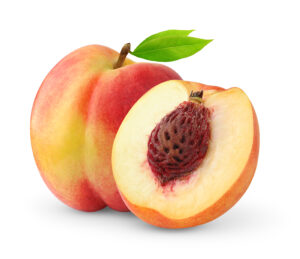 Are you more like a “peach”? Or a “coconut”?
Are you more like a “peach”? Or a “coconut”?
This differentiation comes from the work of culture experts Fons Trompenaars and Charles Hampden-Turner.
In peach cultures, such as the United States, Americans often smile and talk with strangers in public settings, such as stores, school campuses, and parks. Individuals may chat for several minutes or, on airplanes, for hours without ever exchanging names.
When you do meet people, you often immediately call them by their first-name, share details about yourself, and ask questions about each other and your families. If you’re like most of us Americans, your conversations stay on a surface level even when you start to see one another more regularly. To say it another way, you’ve each punctured the soft skin of the peach. But you don’t automatically get past the hard shell of the peach pit.
By contrast in coconut cultures, such as China, Germany, and Switzerland, the opposite exists. Individuals tend to be reserved and formal with strangers, a la showing a harder exterior. Over time, as you have more interactions and get to know each other, those from the coconut culture may “come out of their shell” and start to open up. The relationship can take a while to form, yet it can become a long-lasting friendship.
This peach and coconut relationship continuum serves as a helpful tool to address some of the intercultural communication disconnects many expats and other individuals encounter. For example, after learning about the concept a few years ago, I’ve incorporated it in the formal workshops and impromptu sessions I do for people who’ve moved to Charleston.
Newcomers who’ve been here for several months often comment that they’re pleasantly surprised by the friendliness of Southerners who come across as sincere and genuine. Yet, like other Americans, the Southerners are often noncommittal about scheduling get togethers. And they don’t seem to make overtures to develop meaningful friendships. “What’s going on?” the outsiders ask. Then once they learn about the soft peach with the hard pit, they realize this is nothing about them; instead, it’s a cultural thing.
Cultural experts refer to the hard pit in the middle of the peach as the very private self, which is protected for a select few.
However, to what extent do we Americans even try to pry open our own hard peach pit and delve into our private self? This question crossed my mind after finishing an expat workshop and reflecting about it and a Dr. Brené Brown podcast, which I had listened to a few months earlier on the recommendation of my colleague Mercedes Martin.
In her February 23, 2022 podcast Unlocking Us, Brené interviewed Dr. Shawn Ginwright, a leading US innovator, provocateur, and thought leader on African American youth, youth activism, and youth development. Brené and Shawn discussed this simple yet profound question: “Can we heal the world without healing ourselves?” This question is the centerpiece of Shawn’s excellent new book, The Four Pivots: Reimagining Justice, Reimagining Ourselves, about how social change is deeply connected to our own healing, reflection, and wellbeing.
The first pivot is awareness, moving from lens to mirror. As Shawn explained, we tend to focus our attention, time, and energy identifying external problems and solutions at the expense of exploring our inner thoughts. In other words, we use a lens to examine how the world works around us as our main way to understand the issues we encounter.
Yet, if we only use our brain – that is doing cognitive learning with our lens – without also engaging social emotional learning that taps into our feelings, we miss valuable opportunities to grow as human beings. To become a better version of ourself, address big issues, and deal with any trauma we’ve experienced, we need to pivot and use a mirror to look inside ourself. That means cracking open the peach pit, as referenced in the cultural framework.
Shawn emphasized that using a mirror is hard work. It’s an involved process, not a quick fix, requiring us to face our fears, insecurities, and dreams. Yet when we practice self-reflection and introspection honestly and vulnerably, we can become more self-aware about our lived experiences, values, and biases and more tuned into our feelings. This in turn can help us increase our clarity about ourselves and our situation, as well as improve our well-being. We also can reaffirm our connections with others and the world around us and make better decisions.
Granted, it can be hard to find the time and space to look into the mirror and inside the peach pit. For most of us, our regular days are not designed well for reflection. They’re often packed with meetings, work assignments, other commitments, and the daily noise of life. That means we need to be intentional about making time and space to look in the mirror and reflect – even if it’s just 10 minutes or so at a clip.
When you pause and look inward, ask yourself some questions, such as these five, or any others that you prefer:
To what extent am I focused on my values, interests and goals?
- Where am I headed, and is that the direction I want to go in?
- What’s giving me energy these days, and what’s depleting me?
- What’s working well? What could be better?
- How am I challenging myself so I’ll continue to grow and be and do good? For example, to what extent am I seeking out disruptive experiences?
There are no right or wrong answers or questions. Instead the value of the mirror work is helping you crack open your interior peach pit and peer inside to understand yourself better and get clarity for being a better human being.

0 Comments